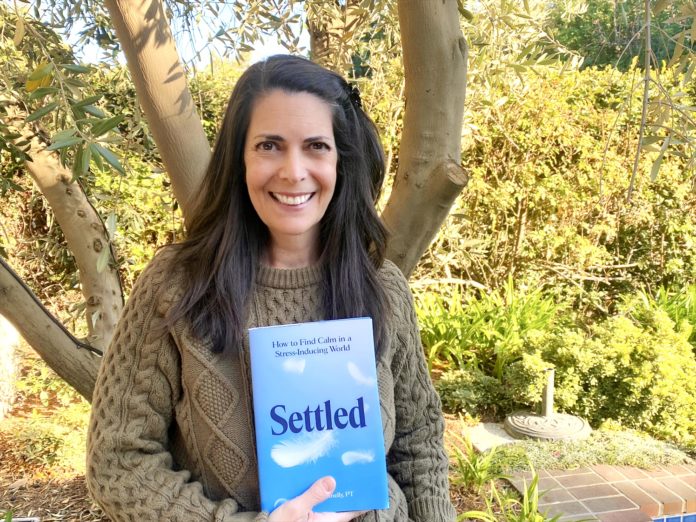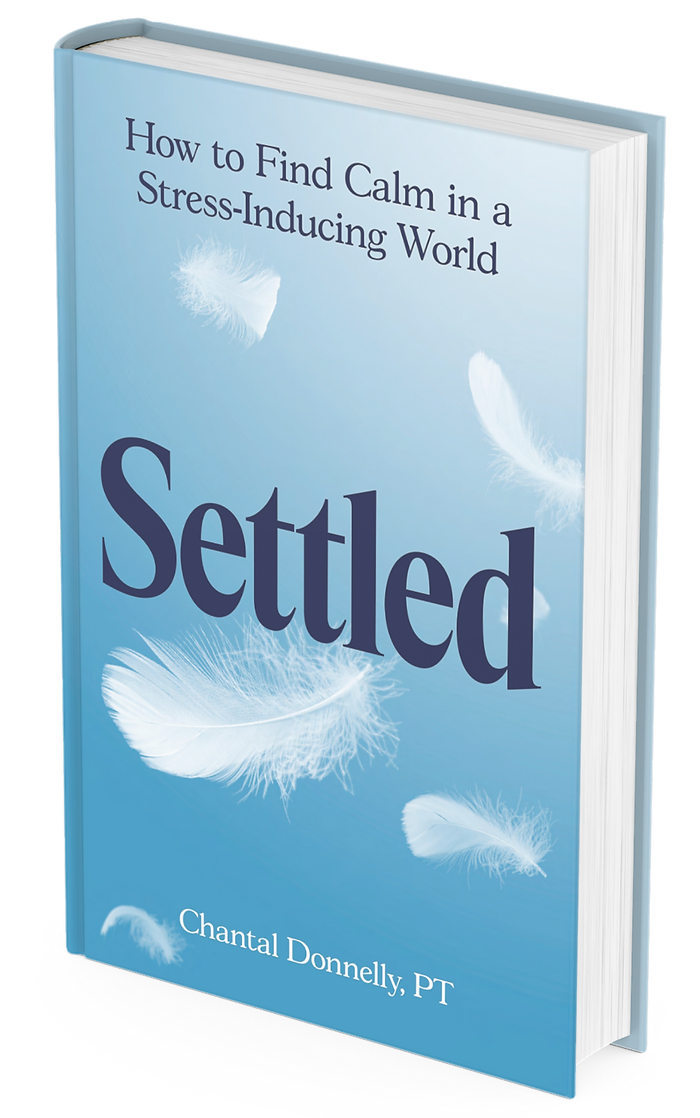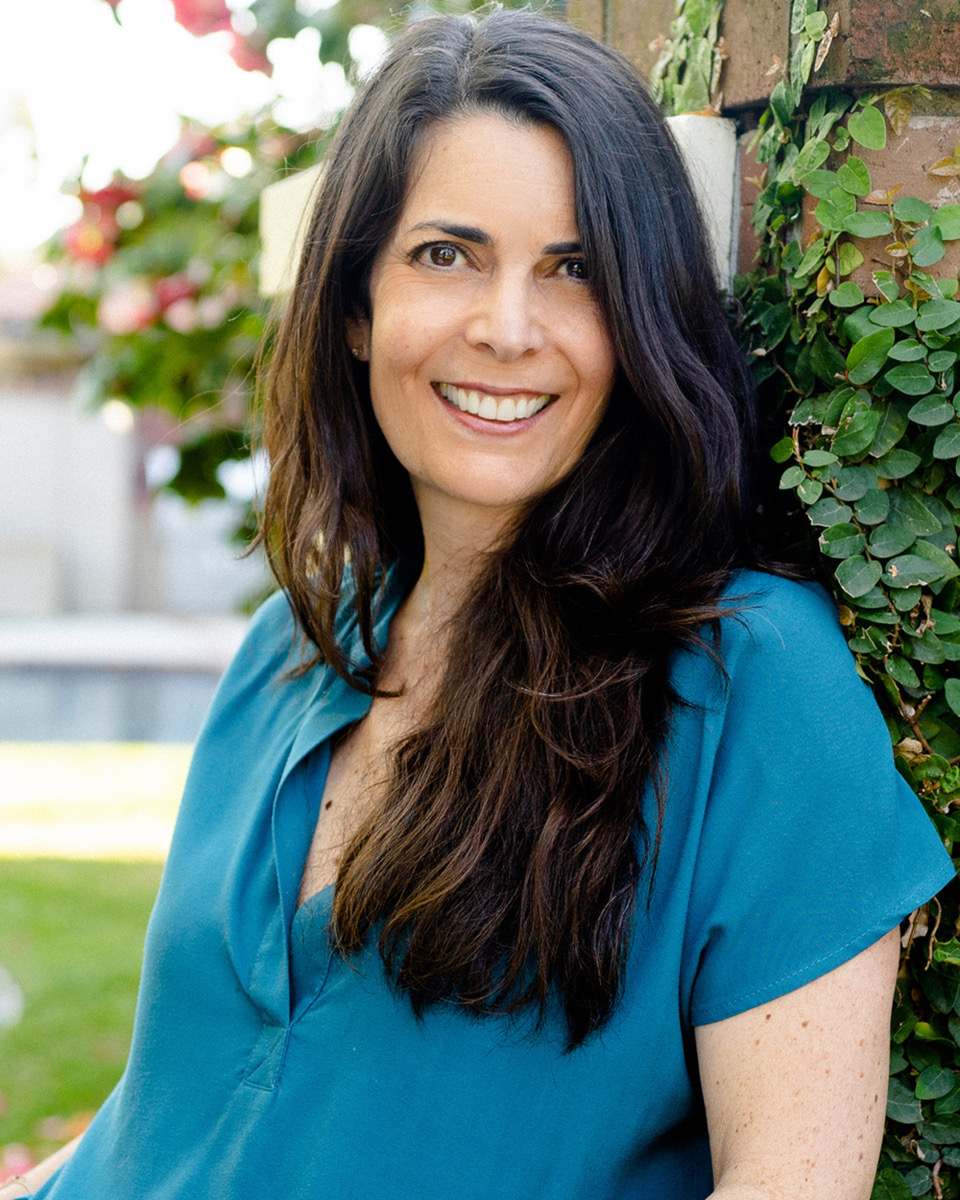
On a recent sunny winter day, local author Chantal Donnelly looks peaceful and energized as she recounts an “aha” moment several years ago.
Donnelly studied psychology and kinesiology at Occidental College and received her master’s in physical therapy from Mount Saint Mary’s College in Los Angeles. She is certified in Pilates and is a physical therapist, Resilience Toolkit facilitator, and founder of her wellness company, Body Insight Inc., where she serves private clients in Pasadena. Although she had a thriving practice, there was a time when she was becoming frustrated by what she describes as a “missing piece” in her PT treatment. “I was seeing my patients getting better on my table, but they would go back to their stressful relationships, jobs, whatever it was, and their pain would return. I got very interested in the science of stress and realized that the missing piece was this nervous system regulation piece.”
She goes on to explain that the nervous system is where stress is created in your body and how that affects your immune system. “It affects the pain signals in your body, it affects your mood and your thinking – it affects everything. I was really struggling to figure out how I could help my patients, without going back and getting a PhD in psychology, to really manage their stress.”
Once Donnelly took a deep dive into the research she realized that her training as a physical therapist was actually the perfect foundation, because she says, “stress is in the body. It’s a biological event that occurs in the body that then affects our thoughts and our mind.” That is when she began learning the tools that are somatic and body-based in nature, to help with stress.
“It was a journey for myself as well,” she explains, “because I was dealing with stress, as we all do, at the same time that my patients were. And the book that I ended up writing was really the journey – my journey of how I started dealing with my own stress as well as what helped my patients. And it’s stress management from a physical therapy perspective.”

The first part of the book is the foundational information that you need to understand your stress, and as Donnelly tells me, “to not pathologize it, to not feel shame about it – to understand that it’s not your fault, it’s not a sign that you’re a weak human being, or a moral or ethical issue. You know, you don’t need to “buck up”. Stress is a natural process. It’s a survival mechanism that is trying to help you but unfortunately, in the long term, is hurting you.”
Part two of the book contains actual hands-on, practical tools that we can use from a body-based perspective, to manage those biological and physiological responses to our everyday stressors. For example, there is a chapter on breathing. “I think we all know that breathing can help with stress,” she explains. “The way I talk about breathing from a physical therapy perspective is, you know, if you’re breathing from your upper chest and neck, you’re actually engaging your fight or flight nervous system. So that’s why when you go to a yoga class or a Pilates class, they’re trying to get you to inhale from your belly or your lower ribcage. So I explain those things so that people can understand why it’s important from a stress perspective – how they’re breathing. When we sit at our desk jobs all day, we actually compress a lot of the muscles and joints that are involved in breathing. We compress our ribcage, we compress our psoas hip muscle, which attaches to our diaphragm – and so what ends up happening is we reduce our ability to breathe properly. We’re getting stressed not just because our boss is giving us a deadline, but because we’re sitting so much and we’re no longer able to breathe properly. So that’s why I included breathing in the book. There’s a chapter on stretching. There’s a chapter on exercising.”
Donnelly gives you techniques, tools, and exercises throughout the book along with the science of stress and personal stories. There are a total of about 30 tools in the book and a special section at the end of the book where all the tools are in one place. Donnelly says that one of the key differences in her approach is knowing that not every exercise works for every individual.
“I teach people how to figure out what tools are working for them. Because not everyone is going to do well with breathing for example. There are people who get more anxious with breathing. And I think it’s important for people to know that because otherwise, they think there’s something wrong with them, instead of just going, “Oh, this isn’t the tool for me. There are 29 other tools in Chantal’s book that I can choose from, let me go see what works for me.” It will turn the way you look at stress upside down.”

Donnelly looks like the cat who ate a mouse when she says this – she’s just that excited about her discoveries and the ways she has seen them work in her own life and the lives of her friends, colleagues and clients. “It will give you tools that are beyond mindset or meditation or even self-care.” We all know that self-care is indeed everywhere these days and while Donnelly acknowledges that as a positive she also says if your self-care isn’t down-regulating your nervous system, then your self-care isn’t helping you.
She uses an example of people planning a getaway. Again, great idea, however if you’re not dealing with what the stress is, then you just come back to more stress; the piled up mail, e-mails, deadlines. “But if you learn how to regulate your nervous system, whether you take a vacation or not, then the impact of those e-mails, the way you respond to those e-mails is different. You have more bandwidth to respond to them, maybe you have more clarity and you’re able to set more boundaries. If it’s a job that’s really causing you to head towards burnout, you now can take a step back and go, “this isn’t really the direction for my life.” Or you can create the job in a way you can manage, in a way that isn’t going to create the burnout.” She explains that when we are in a stress response we lack the mental clarity to figure out what the problem is.
The catalyst for putting pen to paper came as Donnelly shared this information with several friends and clients and they would often tell her she should write a book. Then the day after yet another person had suggested it, a friend of hers told her she was starting a book writing program that would last a year. She signed up and after extending the process with a bridge program and gathering her reams of research and interviews, she finished the book in two years. “It was a huge undertaking. There are a lot of people’s stories in there – so that program plus the many years of research and experience in physical therapy went into the book.”
She emphasizes that this book is about finding what works for you. “As much as things like yoga and meditation can help a lot – they take a big commitment and it’s not always the right direction for everyone. I work with a lot of chronic pain patients – and for them, something like yoga is too much. Instead I can give them a 30 second tool that might be more effective than an entire yoga class. And then they don’t have to feel guilty when they don’t make it to the yoga class or feel worse in their bodies afterwards. With meditation, meditation is very much a brain-down, cognitive tool. Nothing wrong with that – it helps a lot of people – I meditate myself. But when you are in a place of anxiety, it oftentimes is not the right tool at that time. And for a lot of people with body issues, meditation just brings those body issues to the forefront. And that’s all they can think about. And so, again, these 30 second, very grounding, body-based tools seem to have a reset button, that allows your nervous system to calm down really fast, without you having to worry about setting aside time to do them.”
While yoga and meditation are good tools and are certainly trending in our society these days, Donnelly says they can also create more stress when it’s an extreme change to someone’s lifestyle. “People sometimes think something like that is the only direction so when they attempt it, say it’s a New Year’s resolution, and it doesn’t work? There is a downward spiral that happens and they end up feeling worse than when they started.”
Donnelly estimates that she has been incorporating these exercises into her PT work for the past seven years and says it has been gratifying to see the changes in her patients. “What I see with most of my patients is that there is a lot of overlap between chronic pain and stress – and when someone anticipates pain, the stress involved in that actually amplifies the pain. So you have this negative feedback loop happening. The work that I’m doing with the nervous system allows for that to be broken.”
She explains that brain cognitive techniques actually help chronic pain because what we think of as a mental problem, stress, the body actually helps with that – and what we think of as a body problem, which is pain, the cognitive mind approach helps with that. “It’s the reverse of what we all have been taught,” she says.
What she sees in her patients is that they are able to handle life better because they have what she calls a greater settled section. “That’s the word I use in the book to sort of explain this ability to hold something that would have been overwhelming before, but is now manageable.”
Donnelly’s book “Settled” is available now online at Amazon and Barnes & Noble, as well as in select stores including our local bookstore, Vroman’s, where she will be doing a book signing event on Sunday January 28th at 4pm. She will be doing a short discussion, followed by book signing at the author’s area on the second floor. “I’m excited about it. It’s great to be a local author and be independent and to get a little love from Vroman’s.” She says she’s excited to finally get the book into people’s hands.
“There’s so much to say about this book,” Donnelly says reflectively. “It is a totally different method, a totally different approach to stress. It turns stress management on its head and really takes a new perspective. And I truly believe that it’s a perspective that people can find relief from. Your relief from stress doesn’t have to be big or fancy. You don’t have to take up yoga, you don’t have to take up meditation, you don’t need necessarily therapy, or extreme diets. I have a whole chapter on eating in the book, and how to improve your relationship with food. I talk about settling and savoring – settling your nervous system instead of dieting, and savoring is intuitive, mindful eating.”
During our conversation, I had a lightbulb moment of my own. Having lived with chronic pain for 17 years myself, everything Donnelly was saying made so much sense to me. To say I am intrigued is putting it mildly. She graciously signed a copy of her book for me and I will be at the Vroman’s event to learn more. If this speaks to you as well, please join us.
Donnelly will be speaking at Vroman’s Bookstore in Pasadena located at 695 E. Colorado Blvd. on Sunday January 28, 2024 at 4pm. Visit Vroman’s website at VromansBookstore.com for more information.
Chantal Donnelly lives in South Pasadena with her husband Ed and her son, Aiden. She has a private physical therapy practice in Pasadena. You can connect with her at her website www.bodyinsight.com and follow her on Instagram @bodyinsightinc
















.png)






